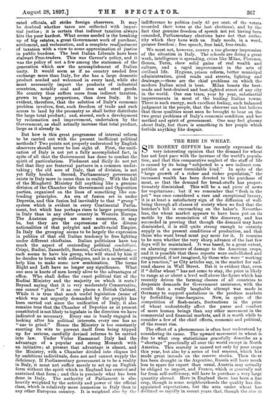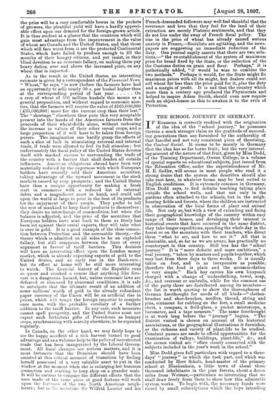THE RISE IN WHEAT.
SIR ROBERT GIFFEN has recently expressed the very interesting opinion that the demand for wheat has not kept pace with the increase of the world's popula- tion, and that this comparative neglect of the staff of life is caused by its being "subjected to a new indirect corn petition of a most formidable kind." In spite of the "large growth of a richer and richer population," the increased wealth has been devoted to the purchase of meat, so that the demand for bread-stuffs has propor- tionately diminished. This will be a sad piece of news for vegetarians ; but if we remember that "flesh in the pot" was once considered a rare and exceptional luxury, it is at least a satisfactory sign of the diffusion of well- being through all classes of society when we find that the butcher's bill is encroaching on the baker's. Neverthe- less, the wheat market appears to have been put on its mettle by the enunciation of this discovery, and has succeeded in proving that though the demand may have diminished, it is still quite strong enough to outstrip supply in the present conditions of production, and that those who want 'bread must pay more for it. It remains to be seen whether the very sharp advance of the last few days will be maintained. It was based, to a great extent, on alarming rumours of damage to the American crops, and it is possible that these reports were embellished and exaggerated, if not imagined, by those who were "working for a reaction," as City articles say, in the market for rail- road shares in Wall Street. But it is evident that, even if "dollar wheat" has not come to stay, the price is likely to range at or about a level well above the figure which has recently driven the farming classes of all countries to desperate demands for Government assistance, with the result that a really laughable attempt was made in Germany to support quotations in the produce markets by forbidding time-bargains. Now, in spite of the competition of flesh-meats, fluctuations in the price of wheat undoubtedly affect the purse and comfort of more human beings than. any other movement in the commercial and financial markets, and it is worth while to consider a few of the chief effects, economic and political, of the recent rise.
The effect of a phenomenon is often best understood by considering its cause. The upward movement in wheat is due to what crop statisticians gracefully describe as a " shortage " practically all over the world except in North America. This scarcity is caused not only by poor crops this year, but also by a series of bad seasons, which has made great inroads on the reserve stocks. Then there has been drought in the Argentine, Russia will have much less to spare for export than usual, Austria may actually be obliged to import, and France, which is generally not far from self-sufficiency, will have to purchase a very largt quantity abroad. Here in England there has been a fine crop, though in some neighbourhoods the quality has dis- appointed expectations, but the area under wheat has declined so rapidly in recent years that, though the rise in the price will be a very comfortable bonus in the pockets of growers, the plentiful yield will have a hardly appreci- able effect upon our demand for the foreign-grown article. It is thus evident at a glance that the countries which will gain most advantage from the improvement in the value of wheat are Canada and the United States, and that those which will fare worst from it are the protected Continental States, which have failed to produce enough to fill the mouths of their hungry citizens, and yet insist, in their blind devotion to an economic fallacy, on making them pay heavy duties, over and above the increased price, on any wheat that is imported.
As to the result in the United States, an interesting estimate is given by a correspondent of the Financial News. " Wheat," he says, "is now (before the farmers have had an opportunity to sell) nearly 30 c. per bushel higher than at the corresponding period of last year On a crop of wheat of 550 million bushels this means as a general proposition, and without regard to economic nice- ties, that the farmers will receive the value of $165,000,000 'X33,000,000] more for the current crop than their last." The " shortage " elsewhere thus puts this very acceptable present into the hands of the American farmers from the proceeds of their wheat-fields alone, without reckoning the increase in values of their other cereal crops, and a large proportion of it will have to be taken from foreign purses. The imagination can hardly grasp the effects of such a slice of luck in stimulating external and internal trade, if trade were allowed to feel its full stimulus ; but unfortunately the fiscal policy of the United States devotes itself with marked success to surrounding the trade of the country with a barrier that shall deaden all outside influences. American obligations abroad have been very materially reduced by the eagerness with which European holders have recently sold their American securities, taking advantage of the upward movement in the stock markets caused by crop prospects ; and the United States have thus a unique opportunity for making a fresh start in commerce with a reduced list of external debts and a magnificent asset in hand, and could call upon the world at large to pour in the best of its products for the enjoyment of their people. They prefer to tell the rest of mankind to keep their products to themselves ; they desire no interchange of commodities, but when the balance is adjusted, and the price of the securities that European holders have sent back to them so freely has been set against their cereal exports, they will take what is over in gold. It is a good example of the close connec- tion between Protection and the mercantile theory,—the theory which is admitted on all sides to be an exploded fallacy, but still reappears between the lines of every argument in favour of tariff barriers. This decision will have an interesting effect upon the London money market, which is already expecting exports of gold to the -United States, and an early rise in the Bank-rate ; but its effect at home will be still more interesting to watch. The financial history of the Republic runs so queer and crooked a course that anything like fore- cast is a dangerous hazard, but, unless economic laws are defeated or obscured by abnormal conditions, it is safe to anticipate that the ultimate result of an addition of some millions' worth of gold to the already redundant paper currency of the Union will be an artificial rise in prices, which will tempt the foreign importer to compete once more, with the probable corollary of a further addition to the tariff barrier. In any case, such measures cannot spell prosperity, and the United States must not expect such fortuitous gifts of Providence as bumper crops, synchronising with scarcity elsewhere, to be repeated regularly.
In Canada, on the other hand, we may fairly hope to see the happy accident of a rich harvest turned to good advantage and as a welcome help to the policy of unrestricted trade that has been inaugurated by the Liberal Govern- ment. All fiscal changes are serious matters, and it is most fortunate that the Dominion should have been assisted at this critical moment of transition by finding herself possessed of a very valuable asset to put in the window at the moment when she is enlarging her business connection and starting to keep shop on a grander scale. It will be curious to compare the different effects that the uses made of the same piece of good fortune will work upon the fortunes of the two North American neigh- bours; but in the meantime Sir Wilfrid Laurier and his French-descended followers may well feel thankful that the reverence and love that they feel for the land of their extraction are merely Platonic sentiments, and that they do not live under the sway of French fiscal policy. The rise in the price of wheat has already caused serious anxiety in France,—Socialists are agitating, and the news- papers are suggesting an immediate reduction of the duty. One journal sagely asserts that there are two solu- tions,—" the re-establishment of the system of maximum price for bread fixed by the State, or the reduction of the the Customs duties on grain and flour. Perhaps," it is pathetically added, "it would be wise to combine the two methods." Perhaps it would, for the State might fix maximum prices with all its might, but dealers could not sell wheat for less than the price paid for it, plus the duty and a margin of profit. It is sad that the country which more than a century ago produced the Physiocrats and helped to inspire Adam Smith, should even now require such an object-lesson as this to awaken it to the evils of Protection.



































 Previous page
Previous page